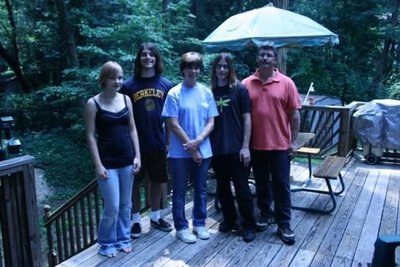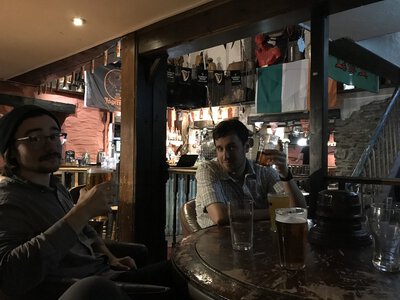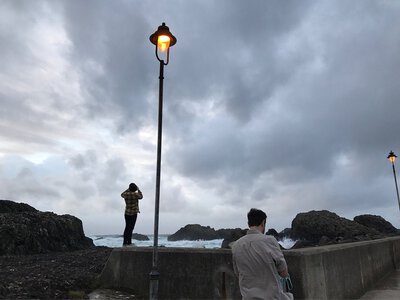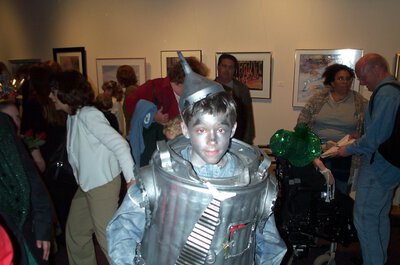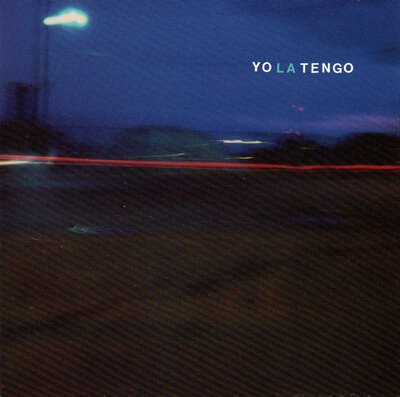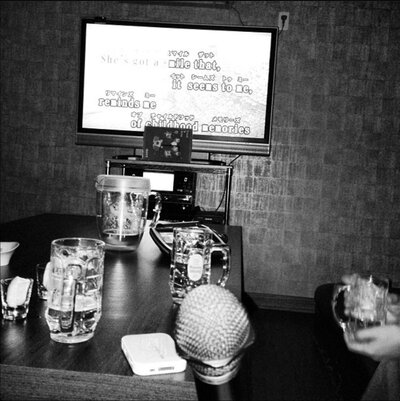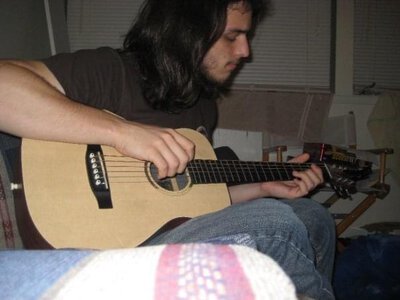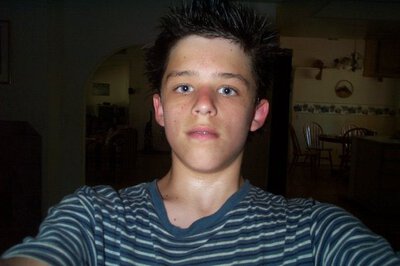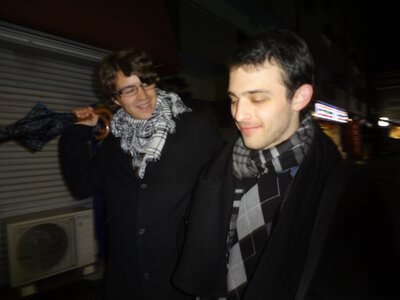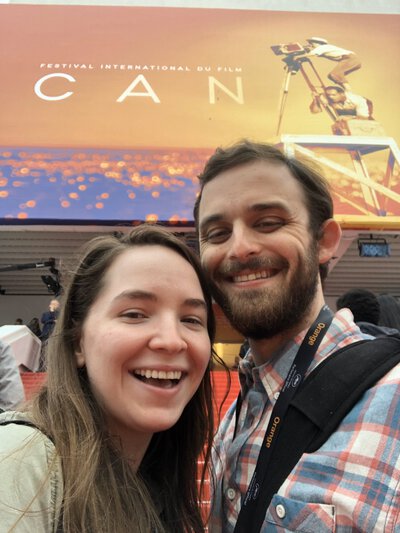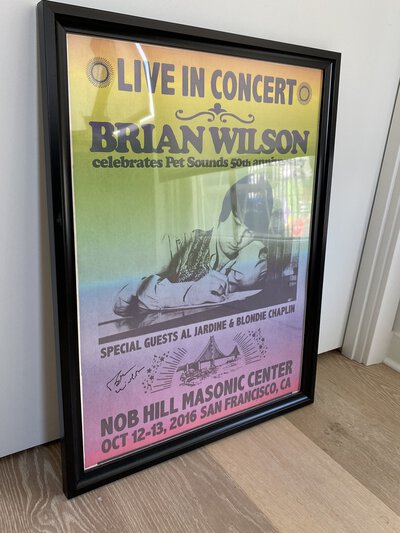This is page 3 of 5. Use the widget below, or go to the previous or next page, or view all combined:
Song #41: Thunder Road
Artist: Bruce Springsteen
Date: April 28, 2020
Listen
Permalink
The New Jersey of my perception is frozen in the past. My parents grew up, met, and got married in the same 20 mile radius the majority of my relatives call home to this day—cousins, aunts and uncles, all four grandparents still mercifully healthy. They all go to the same church they’ve gone since I was a kid, headed by a pastor who is also my cousins' uncle. Then again, everyone seems to be related to my cousins. My subconscious blots out anything that violates the wholesome, small town aesthetic, amplifying custard stands and Sunday evening corn on the cob till the brewery across the street seems like an asterisk, anomaly. It’s as if time stood still when my parents headed west, to thaw every year or two for a wedding or milestone birthday. Everything in its place, exactly as they left it.
I think it’s that sense of past that Springsteen speaks to in me. He’s singing about an era that ended long before I was born, that was already fading by the time my parents moved. But I see it through their eyes, through sepia tinted glasses: taffy on the boardwalk, church basement dances, small suburban streets tiled with hoagie shops and drive-ins that a 69 Chevy with a 396 might just be able to escape from if you let her engine roar. Chalk it up to some collective myth or generational nostalgia. When I find myself in Jersey, I see it overlaid with Polaroids, with the ghost of Bruce’s characters itching to be free. Little Angel on the corner, keeping boys out of trouble. Rosalita, like my mother, longing for adventure, soon to be coaxed out by a fine romance down San Diego way. And always Mary, climbing in.
Born to Run is a constant in my list of desert island albums, hovering somewhere between #1 and #4 depending on my mood. This despite the fact that it is arguably neither the most fun (The Wild, The Innocent & The E Street Shuffle) nor the most accomplished (Darkness On The Edge Of Town) in Springsteen’s early oeuvre. What it is, is the album most filled with potential, with a desire that hasn’t yet been met but (unlike Nebraska) feels strongly within reach. And while I often crave the joy of its ubiquitous title track, my heart will always belong to “Thunder Road.” I love the maturity of it, that gentle hum of sadness, the way Bruce—25 at the oldest at the time of writing—channels something profoundly adult about the passage of time. I’ve repeated the ritual he dictates to Mary more nights than I can count; hallowed text and communion wine, car stereo and gasoline. Pull my beat up BMW onto the freeway, floor the pedal right around “with a chance,” and just as I’m about to hit the legal limit, release and let it glide. I roll down the windows and soar through the night, exhaust-ridden wind wreaking havoc on my hair, its lonely pre-dawn chill bracing enough to conjure a ghost or two.
Well the night’s busting open
these two lanes can take us anywhere
Song #42: Jack and Diane
Artist: John Mellencamp
Date: April 29, 2020
Listen
Permalink
It might surprise you to learn that I was reasonably good at one sport as a kid—and that, despite growing up in San Diego, it was neither Talking About Surfing nor Skateboarding Loudly In A Megachurch Parking Lot. It was skiing. My best friend’s dad was a part-time ski instructor, and my own father was pretty into it too. So once or twice a year, in that two month window when the snow was serviceable, we would make the trek up to Big Bear to spend a day on the slopes.
Time would teach me that I got lucky with skis: When I finally tried snowboarding in my early 20’s, I broke my wrist on the first run of the day. But skiing, somehow, felt natural to me. I would barrel down Double Diamond grades as if they were nothing, and would routinely go entire trips without a single fall. All this without any padding or helmet, which seems unthinkable in hindsight. Even imagining those steep drop-offs and that icy, man-made snow gives me anxiety today, as I tally every bone and tooth a single wrong move could have broken. But from 5 to maybe 20 years old, I was somehow invincible. I raced to the bottom as fast as I could, and I didn’t break a thing.
My favorite part of skiing was always the aftermath, that distinct high that floods your body when it’s finally given permission to feel. These are the moments that make the word “exhausted” feel earned. Everything is depleted, emptied, exhumed; the same coldness that had been bracing now suddenly acts as its own reprieve. Your feet, freed from boots, carry negative weight, and you float to the lodge like a Spike Lee dolly shot to drink a hot chocolate you’re certain is the best thing in the world…till you discover the coffee at 16 and the bourbon at 21.
I was 6 or maybe 7, in the back seat of a minivan, with my dad in the front passenger seat and our friend/instructor at the wheel. Other kids were back there, somewhere, I’m sure, though the details have faded. We were snaking down the one road that leaves the mountain, hoping to reach the freeway before we found a spot to eat. The sun was going down but it wasn’t yet dark, and the floor of the car was soaked with wet socks and slush. It was a wordless drive, mostly, filled with sips and contented groans and whatever Classic Rock station the radio picked up.
When it picked up John Mellencamp’s “Jack & Diane,” our bond of silence was broken. The two in the front cranked up the volume just before the chorus, and proceeded to sing at the top of their lungs. I didn’t know the words but they were easy enough to learn, and by the second time around I joined the choir of Satisfied Men.
Oh yeah, life goes on
Long after the thrill of living is gone
Song #43: Ballad Of A Thin Man
Artist: Bob Dylan
Date: April 30, 2020
Listen
Permalink
In coming up with songs for this week’s theme—songs from before I was born, whose relative popularity have earned them some level of modern day nostalgia—I’ve realized a few things. The first is that I hate the phrase “Classic Rock.” The more I revisit memories of Patti Smith, Leonard Cohen, Bob Dylan, and so on, the more ill-equipped that particular label feels. The second, is that virtually every memory of the-genre-which-will-not-be-named is rooted somewhere in my dad. If not the song, then my love for the artist (Bruce Springsteen, Paul Simon); if not the artist, then the rabbit hole that led me to them. Some are connected by obvious threads (Bob Dylan to The Band, The Eagles to Don Henley) and others by a desire to one-up, be cooler-than (The Who to Patti Smith, Beatles to Velvet Underground). Follow that thread back to its inception, and you’ll find some concert or long drive or couch lecture from my dad.
Nowhere is that tie stronger than with Bob Dylan. My dad is one of the many proud Dylan acolytes: entire drawers of his CD collection were devoted to the man, each sleeve joined at the hip with some concert story or stray bit of trivia. When I was in high school, he took my brother and me to see Dylan at the Cox Arena; ten years later, I would take him to the Shoreline Amphitheater to try and return the favor. In the years in between, I could only hope to build cred by referencing a song or album that was off the beaten path, by tossing out a stray lyric at the appropriate moment, or (if I was really lucky) by making a contemporary music recommendation he would like in turn. (My one true success story in this department, Wilco, would wind up co-headlining that Shoreline show).
This memory is from an early age, though exactly how early I do not know. We were driving in the dark on the way home from Palm Desert, where we’d met up with relatives earlier that week. My mom and sister were staying longer, so the three boys had the car to themselves. We had taken a shortcut somewhere near Hemet, and there was a very real chance that we were lost. But if we weren’t lost, oh boy, were we making record time.
That drive was my first formal introduction to Dylan, via the album I’ll maintain is his unparalleled best: Highway 61 Revisited. We listened to the record in its entirety, with each song elevated by some verbal commentary from my dad. I remember at the time having the distinct impression that this was important; that there was something for me to “get.” Maybe it was his enthusiasm doing all the heavy lifting, but in my memory of this evening it was love at first listen. I loved his nasally affect, his ramshackle delivery, his jangling arrangements, and especially his lyrics. “What do they mean?” I asked, falling into Dylan’s trap. “No one really knows,” my dad explained, “and that’s what makes them so great.”
One song in particular struck me as so “random,” so “crazy,” I thought it would be hilarious to analyze for a school assignment the next week. Sword swallowers? High heels? One-eyed what’s?! “Give me some milk or else go home”? What would my teacher think, right dad, haha? “That one…” he waded in cautiously “…that’s actually one where I think we know what he means…”
Song #44: You Can Call Me Al
Artist: Paul Simon
Date: May 1, 2020
Listen
Permalink
We had one night in Dublin, and we were going to make the most of it. The last few days had been spent in England and Wales (same conference as Song 4, 1 year later), and the next few days would be a blur of transit: rent a car, drive up the coast of Northern Ireland, catch a boat to Islay, realize the boat service has been cancelled, race to Belfast Airport, yadda yadda yadda. I won’t bore you with the logistics, except to say that we wound up hitting all four countries of the United Kingdom, and Ireland, over the timespan of about a week. I can’t in good conscience recommend the pace, but if you find yourself doing it, the view is fantastic.
I hope I’m not playing into cheap stereotypes when I say that Dublin is a phenomenal city for drinking. Blame Joyce if you must, or my own impressionability. It was my second time in the city, and as the designated tour guide, I felt it my duty to cram as much as possible into our lone evening. We imbibed whiskey flights at Jameson, sipped stouts on The Brazen Head patio, raided multi-story pubs (clubs?) for cocktails as we rolled back up the Liffey, and wound up in Temple Bar exactly on schedule. If there’s a cliché we missed that doesn’t rhyme with Schuinness, I’m unaware of it.
What truly sets Dublin nightlife apart isn’t the alcohol, but the ever-present live music surrounding it. It makes every night feel joyous, intentional, a conscious celebration. I remember settling into the top floor of The Porterhouse Temple Bar, nabbing a table not far from the stage. The band had a delightful presence, and it wasn’t long before the evening became a full-fledged, sloshy singalong. My favorite selection by far was this Paul Simon classic, imbued with fresh meaning for me in that exuberant crowd.
He is a foreign man
He is surrounded by the sound
Song #45: The End Of The Innocence
Artist: Don Henley
Date: May 2, 2020
Listen
Permalink
It was a day ending in “y” after 2016, which means something infuriating had happened. Beyond that fact, I couldn’t for the life of me tell you what it pertained to or when it occurred. Call it age, or awareness, or an unhealthy addiction to political podcasts, but being outraged about things I cannot control is a near daily occurrence. Even calling it “outrage” feels wrong, somehow; it’s more ambient than that, more relentless and numbing. Outrage is a dry heat, something from which you recoil. Whereas this is a muggy Florida August with a busted A/C and all leather furniture. It’s omnipresent, and gross, and there’s no delineated ending. It lingers, and the fact of its lingering is almost uglier than the feeling itself.
I was riding the bus in San Francisco in the summer, heading to a theater with a working A/C. The movie wasn’t starting for at least an hour, but I needed the illusion of forward progress. My irritability extended to the SFMTA itself: its creaky screeches, its shouting occupants, the way every acceleration seemed accidental, wrong. These days are the polar opposite of Song 27; ones when the beauty almost entirely eludes me, when the symphony of the city reads only as noise. I threw on headphones and reached for the first artist that popped into my head. I’d never consciously listened to his solo work before, but The Eagles had come up in recent conversation and Don Henley’s name was top of mind. I tapped on an album, The End Of The Innocence, and the title track began to play.
The song came out a week or two after I was born and was recorded years prior. But as I listened, I had the distinct impression that Henley was speaking directly to me, to my time and place. As a sentence that’s hackneyed (music “speaking directly to me”), but as a lived sensation it’s as good as it gets—art clawing its way through miles and decades to clarify your particular moment. I felt his bitterness mingled with exhaustion, the sense of things irreparably changed. “Happily ever after fails, and we’ve been poisoned by these fairy tales.” I savored the impotent rage of “this tired old man that we elected king.” But he didn’t sink into the leather, didn’t stew in that heat. He channeled it into adulthood and, by proxy, romance. My anger was a form of healthy disillusionment; it could numb me if I let it, but that wasn’t the only option. I could rise above it, live alongside it, render it into art. I looked out the window, oh beautiful for spacious skies, gleaming through 7 figure condominiums and dull yellow cranes. For a moment, it was good.
Just lay your head back on the ground
And let your hair spill all around me
Offer up your best defense
This is the end of the innocence
Song #46: If I Only Had a Heart
Artist: The Wizard of Oz Original Motion Picture Soundtrack
Date: May 3, 2020
Listen
Permalink
King Triton. Captain Hook. LeFou or “Claude,” depending on your tolerance for copyright infringement. And, most pertinent to this entry, The Tin Man.
My middle school was set up with two alternating tracks. Track A would come to school Mondays and Wednesdays while Track B studied from home. On Tuesdays and Thursdays, the equation would be flipped. And on Fridays we would all assemble together for a handful of electives. For me, this meant Choir and Music Theater.
It’s funny to remember just how big a part of my life this was, considering that I would spend the next 8 years desperately avoiding any whiff of public speaking. So why, at the height of puberty and shy self-awareness, did I willingly participate in—and not only participate, but take major roles in—musicals? Had I not yet developed my sense of anxiety? Or was my thirst for companionship (and my tautological crush on every leading lady) so strong that it simply overshadowed my fear? I don’t know. But for four semesters that’s exactly what I would do: audition for every play our school put on, bag a leading- or near-leading- role (male participants being scarce, and ones willing to sing being scarcer), and proceed to tie myself in nervous knots for 8 to 10 weeks till the performance was over and the cycle could repeat.
Picture a 12 year old with a slight lisp, his face caked in silver, belting a Peter Brady half-falsetto while wearing a costume made out of an actual garbage can. Are you wooed yet? I hope so, because that was my ‘A’ move and I took it very seriously. I watched the classic film for inspiration from Jack Haley. I practiced jumping heel-clicks so relentlessly I can perform them to this day. And I paced that stage night after night, metallic beads of sweat pouring down my face, praying I’d nail the high “picture meeee” without cracking or fainting. (This even after my mom, a talented pianist, manually transposed the accompanist’s sheet music down a few steps to give me a fighting chance.) I will never know if I pulled it off, or if the world only humored me. But I do know Dorothy threw me a “Great job” backstage, and that would be enough to tide me over till spring.
Song #47: Two Women
Artist: Angels Of Light
Date: May 4, 2020
Listen
Permalink
Heading east on I-80 just before sunrise, there’s this moment when everything comes into view. The C&H Sugar factory appears to your right, the Carquinez / Zampa Memorial bridges open up ahead of you, and the first glint of sunlight peeks over hills in the distance, casting the San Pablo Bay in a red-orange glow. It’s one of those transitory places that could seemingly only exist in motion. Take the next exit, slow down for a photo, and it all might vanish as suddenly as it appeared.
I should not have been driving. I’ll say that up front. It was the summer after my Junior year of undergrad, and I’d just pulled three consecutive all-nighters for a conference submission (the eventual acceptance of which would lead me to the rooftop of Song 31). No part of “three consecutive all-nighters” is exaggerated in the slightest, and yes, I also find that unthinkable from where I sit today. Lose one night at 30 and I’m a zombie by lunch, but at 21 I believed myself to be wholly invincible. Amped up on the adrenaline of a barely-met deadline (or was it gallons of espresso from the lab’s new machine?) sleep was the furthest thing from my mind when I finally hit “Submit.” Instead I raced home, packed a bag, and hit the road.
I was swinging by Davis to pick up a friend, before continuing down to San Diego for the rest of the summer. The week had been absurd, and my senses were clearly shot, but my memory of that hourlong drive is nothing but peace—the sugar, the sunrise, the shimmering to my left, the dawning of a month without the pretense of work. That weightless sense of having survived something impossible. Floating up the interstate in a sleep-deprived stupor as Angels of Light announced the arrival of the day, I was filled with conviction about nothing in particular: “through the hills of iron, through the leaves of rust, through the turning white mist” and on up to Yolo County.
I arrived around 7:30, shot my friend a text, scooted to the passenger seat, and promptly passed out. When I awoke 7 hours later, the LA sun was blinding. We were almost home.
Painted red, with golden cross
And in your hands of glittering blue
You hold the knife that cuts the sun,
The polished knife, it cuts me too
Song #48: Big Day Coming
Artist: Yo La Tengo
Date: May 5, 2020
Listen
Permalink
Is there anything more romantic than an airport runway before dawn? I submit to you that there is not.
If you’ve been reading along for any stretch of time, you know that I mean “romantic” in the classical sense—achingly emotional, having the power to tint memory. Wherever I go and however often I go there, I always carry a piece of that moment before takeoff. Gray-blue and orange reflecting off the window, bleary-eyed travelers settling in for a nap. Back-of-the-napkin timezone calculations, the sense that things are finally secure. Booking is a crapshoot and airports are hell, but slumped in that seat with the engine whirring, nothing left is asked of you but to flow through it, survive. All the floating conviction of yesterday’s post with none of the danger or sleep deprivation. It may very well be the most peaceful place on earth.
Plenty of musicians have tried to capture this sensation. Lost In Translation devoted an entire soundtrack to it, and I’ll admit that My Bloody Valentine has appeared on more than one pre-flight playlist. But no song has whispered me into as many journeys as “Big Day Coming” by Yo La Tengo. It might be the most visceral connection of this entire project: It sounds precisely like the morning runway feels. That reverb-drenched organ, droning like the hum of a propeller. The crackle of distorted feedback, jet planes passing overhead. Even the album cover commemorating the view out my window, somehow becoming the view more fully with each passing measure. It’s the sound of a gentle tug, of a future on the horizon, in no hurry to open to you, taking its time.
We’ll be on the outside
We won’t care
Because we’re together
And that’s somewhere
Song #49: The End Of The Rainbow
Artist: Richard and Linda Thompson
Date: May 6, 2020
Listen
Permalink
Rain sprinkled on the winding path, light but continuous. It was summer of 2013, and I was walking through the Tiergarten near my hotel in Berlin. It was still the invisible sort of rain you could only prove by inference: tiny dark circles blooming underfoot, accumulated pools on an Old Navy peacoat, too heavy to be mist. There were a handful of Biergartens along this stretch of road, and their occupants were drifting inside at an unhurried pace. For now it was livable, but it would surely get worse.
I had just left one of those Biergartens myself, and a half liter of Dunkels sloshed around with each step. I was filled with a good kind of sadness that I associate with rainy days and travel: sad in the way that a drama makes you sad, beautiful, external, to be leased instead of owned. Like any mind-altering substance, it’s a double-edged sword. You can grow addicted to the good stuff till it becomes something else, or you can down a single glass of it and be on your way. This moment in the park was an exercise in moderation, light but continuous, glistening but not soaked. In my recollection it was just about perfect.
Context is important here. I was on the first leg of a three week trip which would have me circle the world for the very first time. San Francisco to Berlin for a weeklong robotics conference; Berlin to Tokyo, to consult the startup from Song 28; Tokyo to San Francisco, where life would resume. East, East, East, in a collection of ~8 hour leaps. A week prior I’d been sitting in my lab at Stanford, trying to work out who would reimburse which flight. A week later I’d be climbing Mount Fuji (if you call standing in line on a stairway “climbing”) in the same tennis shoes and coat that were presently mounting evidence for rain. On neither trip would I be remotely alone. Yet the combination of the two felt uniquely isolating. I was hurtling through a life of my very own design—academia and industry, Western Europe and East Asia, two places wholly disconnected except for my choice to pass through. There was no constant but motion blur. I was becoming unglued.
Rain was starting to come down a bit heavier. It was time to leave the park. I opened my umbrella, consulted a map, and reached for my headphones. There are a thousand reasons I might have picked this song—raindrops and rainbows, the good kind of ache, nothing at the end of my circular journey. Maybe I was just on a Richard Thompson kick that week. However I got there, it’s tied to this memory, now, and the feeling it expresses: unmoored and in transit, propelled by a lack of meaning I could steer.
There’s nothing at the end of the rainbow
There’s nothing to grow up for anymore
Song #50: Mr. Brightside
Artist: The Killers
Date: May 7, 2020
Listen
Permalink
Lukewarm cups of Sapporo on the table. Shot glasses emptied of shochu, stacked in a pile. Our voices hoarse from far too much shouting, dizzy from digital lights and sleep deprivation and everything else scattered glasses imply. It was 2012 in Tokyo, and we were singing karaoke.
I have countless karaoke memories I could have pulled for this song, but this is my favorite. We were four temporary coworkers pushing on a big project. This is that relentless period I mentioned before, the one without a single day off. If we couldn’t swing a day, we would at least steal an evening. One of us was leaving the country in the morning; another had just had his heart broken by a girlfriend back in the States. “Hows” and “Whys,” like the customer, could wait. Tonight was for emptying, exhuming the thing.
My perspective is narrow and undoubtedly skewed, but I can’t untangle the Tokyo night life from the rigors of Japanese business. I see it as a cycle of tension and release, restraint and liberation. On one end: 12+ hour workdays as a matter of habit, a degree of workplace formality that’s largely vanished in the U.S., a hierarchy of compounding stressors—a boss that doesn’t leave until his boss leaves, on and on up to the top. On the other: Akihabara, deafening nightclubs, roaring arcades where you dance till you drop, smoke filled all-you-can-drink Izakaya leading to suit-and-tie businessmen passed out in their cars, Pachinko machines that flood every sensory organ at once. If rising industry is a pressure cooker, karaoke is one brief moment to lift the lid: Grab a few friends, rent a box for an hour, and scream your way to equilibrium. The need is universal, of course. Peek into any DC cocktail bar or strip club off Wall Street, and you’ll see the same cycle of tensions at work. The Tokyo variety just seems more honest, somehow. Like it’s fully embraced the metaphor.
We brought an eclectic mix of backgrounds to the table: California, New Hampshire, Transylvania, Shanghai. But we were all born in the 80’s, and the monoculture is strong. Most of the songs we all four knew by heart, albeit sometimes only as a collection of syllables (my “Ma Ya Hi” a source of laughter for the Romanian, his “Hey Mister Tambourine Man” pronounced as one fluid noun). However we knew them, we were determined to love them—dancing on couches, spilling raised glasses, big-finish knee dives that were never as cool as we’d hoped. When “Mr. Brightside” came on, it became a duet for the Americans. One was numbing the pangs of fresh heartbreak, the other hadn’t felt a pang in far too long.
I’m coming out of my cage.
Song #51: Get Me Away From Here I’m Dying
Artist: Belle & Sebastian
Date: May 8, 2020
Listen
Permalink
After braces turned my embouchure into a war zone, I gave up the trumpet and switched to guitar. For the next decade, from high school through grad, music was my primary (sometimes only) pastime. I played an acoustic on a near daily basis, plucked from a rotating cast never larger than two: a Taylor Big Baby I’d pass on to my sister, an LX1 Martin I’d donate to a friend, a gorgeous handmade cedar top too gentle for this world (or at least for medium gauge strings), the replacement spruce top and Alhambra classical that presently live in my office. Lugging cases through airports, jamming with friends, noodling through the same few arpeggios for hours on the balcony when the sun was coming up soon and I simply couldn’t sleep. Even now, in times of stress, I reach for a guitar. But today it’s a nice-to-have, a microdose of therapy. For ten or so years it was a core part of my identity.
Most things I played were melancholy in nature—see Song 49’s “good sadness” or 2/3rds of this thread. Fingerpicked strings lend themselves to sorrow, and “mournful” is the easiest tempo to hit. But despite what the title would have you believe, my single favorite guitar memory isn’t dour in the slightest. It’s hopeful, uplifting, and downright twee.
We were sitting around a fire pit in Oceanside Harbor. It was either the summer or the weekend, senior year of high school or back from freshman year at Cal. Whenever it was, we had nowhere else to be. It was late and windy and we were all bundled up, post- hot dog and s'mores, pre- whatever came next in those years before bars or 11pm bedtimes. Two or three of us had brought guitars, and at some point the evening devolved into a jam session.
After a few fits and starts, the chord progressions cohered into Pachelbel’s Canon, which meant a dozen radio hits were now on the table—"Basket Case,“ "Sk8er Boi,” the theme song to Friends. But we were not radio people. We still had our cred, and “pop” was only allowed if the prefix “indie-” came with it. Someone in the group threw out the opening line from this Belle & Sebastian classic, and for the next 4 or 5 minutes it was an exuberant singalong. There would never be another quite like it. Careers, breakups, moves, new circles—time was already in the process of changing the dynamic. For a moment on the beach, though, we were entirely free.
With a winning smile, the boy
With naivety succeeds
At the final moment, I cried
I always cry at endings
Song #52: Let That Be Enough
Artist: Switchfoot
Date: May 9, 2020
Listen
Permalink
In 2001, I attended my first real concert. That isn’t to say it was the first time I saw live music; only that it’s the first time I decided to go to a venue, to see an artist I’d chosen, surrounded by friends. The venue was my church gymnasium, the artist was Switchfoot, and I probably had a crush on 50% of said “friends.”
If you went to high school in the 2000s there’s a good chance you’ve heard of Switchfoot, whose “Dare You To Move,” “Only Hope,” and “Meant To Live” would all receive sizable radio play for a hot minute (the first two boosted by the Walk To Remember soundtrack, an association I somehow took pride in despite having never seen the film.) So you might be surprised to learn that not only were they an unambiguously Christian band, but they were the hyperlocal variety that would headline a suburban church gym. Mandy Moore’s film was still a year out at this point, and I (like much of the world) had never heard of them before. But an 8th grade girl I met at Winter Camp insisted I’d love them, so I resolved to prove her right. I devoured their first three albums in preparation for the big show.
I knew at some point this project would include this concert, but I couldn’t for the life of me pick the song. Would it be an obvious hit (“Dare You To Move,” “Learning To Breathe”), a motivational banger (“New Way To Be Human,” “Love Is The Movement,” “Something More”), or one of the sillier ones we rocked out to together (“Company Car,” “Poparazzi,” “Chem 6A”)? All conjure impressions of that crowded, retrofit basketball court: the surf-ska-what-exactly-was-it energy bursting from the stage, the chorus of adolescents singing their hearts out, the tug of excitement I’d carry through decades of shows to come. My first sense of being a part of an opt-in community, of letting music become something more.
It wasn’t until yesterday’s beach memory that I found my answer. I had to pick the song that punched me in the gut, when the cheering died down and the lights tinted blue and the band went acoustic as Jon sang from the heart. For the next two years at even the slightest provocation, I would bust out my guitar, play the deceptively simple, fingerpicked riff, and sing along as if the words were my own.
And I feel stuck watching history repeating
Yeah, who am I, just a kid who knows he’s needy
Let me know that you hear me
Let me know your touch
Let me know that you love me
And let that be enough
Song #53: Your Love Is Strong
Artist: Jon Foreman
Date: May 10, 2020
Listen
Permalink
11 years after yesterday’s show, I found myself in a very different circumstance. Phone chipped, stomach queasy. I hadn’t eaten in over 24 hours, but I didn’t have any cash left in my wallet. It was a little after midnight in the Bunkyo district of Tokyo, and I was walking on a quiet street somewhere between Kasuga and Koishikawa. This is the story of my second (and last) blackout.
It had all started the previous afternoon. I was aimlessly exploring Odaiba when the CEO called. A pair of roboticist were visiting from Germany, and he wanted me to help recruit them—emphasize “Stanford,” overstate my relationship with a few prominent professors, the classic routine. He gave me the address of an izakaya in Ginza, and two hours of bungled directions later, I arrived.
I have only myself to blame for what happened next, but a few factors did me no favors. It was an all-you-can-drink establishment. I had been running on fumes and had barely eaten all day. Worst of all, I was late to the party: The line “You’d better catch up” resounded like a death knell. They had sake; I ordered a whisky. The waiter filled a tall glass up to the brim. I raised it with a “kanpai!,” tipped it, and—nothing. The memory ends.
Five seconds later it was the following morning, and I was flat on my stomach on my coworker’s floor. Across the room lay my only coat, crusted in an unholy combination of [REDACTED] and [REDACTED]. I scrambled toward it and dug through the pockets, where my passport was—thankfully, amazingly—safe. Also safe was my new iPhone 5 (albeit cracked at the corner), lit up with a half dozen messages. The most troubling ones came from a childhood friend, a volunteer worship leader and just about the nicest guy on earth, regarding the “strange,” lengthy phone call we’d had. (“I’ll scan a point cloud of my you-know-what, 3D print it, and write your name on it” is all he’s told me of that $150 conversation). Everything was spinning. Nothing made sense.
In hindsight, this memory is mostly amusing: the R-rated phone call with a person in ministry, the Germans who somehow decided not to join our team. But I cannot stress how terrifying it felt in the present: totally helpless, absent all recall, awaiting revelations of what I had or hadn’t done. I’d narrowly dodged so many bullets—a wrong turn, a lost passport, a less caring coworker—and rather than be thankful, I was paralyzed with dread. I spent most of the day alone in that apartment, head in a toilet, imagining literal poison. When I made it to the office around 7pm, my colleagues clapped me on the back and praised my “performance,” but I couldn’t bring myself to laugh. My appetite finally returned some 5 hours later, and I left to grab a feast of rice balls and bento from the Lawson next door. At which point I discovered the empty wallet, apologized to the cashier, reshelved my dinner, and headed (tearfully) to bed.
The walk home was peaceful, with single-story homes and a smattering of shrines and never a hint of a car. But I remember it with a visceral, past-tense anxiety. It was, in a sense, the polar opposite of Song 10’s thrill: I didn’t find the party romantic anymore. I found it repulsive. So it shouldn’t be surprising where I reached for respite, back to that church gym, to when it all still felt pure. The lead singer of Switchfoot had recently gone solo, and I’d downloaded his album at the suggestion of a friend. Now I let it wash over me. That hollow walk home became a prayer of repentance—to whom, and for what, I will never discern.
The Kingdom of Heaven is now advancing
Invade my heart, invade this broken town
Song #54: Falling Slowly
Artist: Glen Hansard and Marketa Irglova (Once Original Motion Picture Sountrack)
Date: May 11, 2020
Listen
Permalink
There’s something about co-ed duets that always gets me. Lump them in with the drives of Song 17: they simultaneously are and aren’t romantic, both special and mundane. They’re fueled by regressive gender norms, sure, but they also twist backwards, undermine them in the same breath—the woman giving the man “permission” to be gentle, their voices commingling to one in-between thing. The cracks in his rugged, gravel-throated armor; the power of her volume, often the true driving force. Softened masculinity, propulsive femininity, meeting to create something delicate and true. You psychoanalyze; I’ll just sit back and listen.
This week is devoted to movies: specifically, to songs that I discovered through a motion picture soundtrack. That relationship matters, even when the memory has nothing to do with the film. It’s something about atmosphere, about being primed to make connections. The director ties a song to a mood, I experience a similar mood in my own life later, and by some transitive property the song becomes mine. See the previous John Carney entry, Song 23, for an example of that calculus: Sing Street pairs a song with adolescent self-determination in 1980’s Ireland; 24 hours later the song pairs with my own emotional self-determination in 2017 Boracay. The structure is there if you really squint (heartache, motion, leaving an island on a boat), but the meaning is almost completely transposed.
Once was my first experience with independent cinema, or at least with the understated variety that defines my tastes today. It planted the seeds of an idea which Rachel Getting Married would bloom into a full-blown revelation: Art could be almost entirely about feeling. Nothing needed to “happen” for everything to happen; it could be experiential, searching, guided less by a narrative than an emotional logic. In hindsight this seems obvious, and neither film comes close to the concept’s purest expression. But they were gateways for me, and they subtly wore down my defenses. Hansard and Irglova’s duets became a shorthand for vulnerability writ large, for the very idea of living a heart-open life.
My friend who lived in Davis wanted to learn to play guitar, and over a few years of visits I tried to give her lessons. “Falling Slowly” was one of the first songs we worked through. We’d sit on the floor of her dorm room passing my Baby Martin back and forth; I’d play one measure, she would do her best to mimic it. What began as chords became full-blown picking patterns, until eventually she was able to play and sing it all at once. At that point, our lessons turned into impromptu duets—me at the keyboard doing my best Marketa, her on the Martin (which by then she’d inherited), wailing like Glen. What I love about this memory is that it never turns romantic. That might sound strange to mention, but at 19 years old, it’s a gift. In a hormone-addled era we acted as platonic escapes. Through breakups and rebounds and self-destructive habits, we maintained the openness, the safety of that space. Years would eventually see us diverge, but I’ll always remember those moments in song.
Falling slowly, sing your melody
I’ll sing along
Song #55: Shallow
Artist: Yann Muller (cover of Lady Gaga & Bradley Cooper)
Date: May 12, 2020
Listen
Permalink
Today was meant to be the first day of the Cannes Film Festival. Right about now the carpet would be teeming with paparazzi, and I’d be standing in line to catch the Opening Night film. That used to mean literal begging in the streets. This year, though, I had things all figured out. I’d have a 1BR apartment three blocks from the Palais, a full night of sleep from an upgrade bought with points, and (thanks to a media sponsor) a Press badge around my neck. Two full weeks of nothing but cinema. I would catch 4 films a day, easy, sleep 5+ hours a night, and see what creative sparks might fly.
There are many reasons to be angry about COVID-19, and an international festival is so far down Maslow’s hierarchy it feels pretentious to bring up. But I’d be lying if I said I didn’t grieve it. Not just Cannes, but the connectedness it stands for. When will I sit in an auditorium with 2300 strangers again? Will every cough make me anxious? Will I wipe down my seat? Will my bowtie be paired with an N95 mask? Will we even be able to fully let go, with our mortality making so much goddamn noise? Film will survive, and I’ll continue to love it, but there’s a naivety I’m not sure I’ll ever get back. We all have those memories that feel out of time—business meeting handshakes, shared communion wine. Standing in line at the Grand Theatre Lumière, shoulder to shoulder with thousands of others. That one is mine.
It would have been my third year. 2018 was a 4-day whirlwind, and in 2019 I made the full 12 day plunge. Joanna joined me for the tail end of the latter. It was a groggy Friday morning, the last of the festival proper, and the accumulated exhaustion was starting to hit. It was a good exhaustion, make no mistake—brimming with memories of discovery and full-house premieres, of Parasite and Pain and Glory and Portrait of a Lady on Fire, of standing two rows from Terrence Malick screaming “Bravo,” of sitting through all four hours of Mektoub My Love: Intermezzo and bitterly laughing till my throat was hoarse. But 3am Big Macs chased by 7am alarms, they start to add up by week #2. Joanna’s presence was a shot of life, a reminder to eat at least two meals, to enjoy some modicum of sleep, to at least notice the beach (nevermind actually going).
We were sitting in a juice bar when a song came on the speaker. It was a cover of “Shallow” with a deep house beat, made by a DJ local to Nice. I mean this as a complement: it was the single most European thing we’d heard in our goddamn lives. We bobbed along and smiled deliriously, then we Shazam'ed and replayed it for the rest of the trip. When I proposed two weeks ago, I timed my speech to music. Before I got down on one knee to a Magnetic Fields number (Song 39), this song accompanied her entrance.
Tell me something girl
Song #56: Chocolate
Artist: Snow Patrol
Date: May 13, 2020
Listen
Permalink
On I-5 in South Irvine just after midnight, the drive becomes an amusement park. Shimmering storefronts to your left, literal ferris wheel to your right, and up ahead a road wider than rhyme or reason—all 26 lanes of the El Toro Y coming together like a zipper, a pinball machine, a rollercoaster with too many parallel tracks. It’s daunting, bright, and designed for heavy traffic, but for a few secret hours you have it all to yourself. It feels like getting away with something, like cutting in line, speeding through the scenery on your return trip home. All the thrills of Space Mountain with none of the screaming kids.
The two of us were heading back from Disneyland. I was a senior in high school and had gotten my license one year prior, which meant I was finally allowed to drive passengers without adult supervision. My girlfriend and I resolved to make the most of our newfound freedom. We woke up at sunrise, grabbed breakfast en route (Einstein Bros bagels—everything I ate this day is inexplicably catalogued as “very important” in my brain and must be painstakingly reproduced), and spent the full day at Disneyland. 8am open to 12am close. How exactly we managed to kill 16 full hours in the fourth most exciting amusement park in the greater LA area, I really can’t say. Though I suspect it had something to do with the removal of my braces and PDA. Please, no further questions. (Cinnamon mochas comped by a stranger ahead of us in line; overpriced burgers and chili fries in Tomorrowland; one of those giant turkey legs you spend your entire childhood coveting and can now just, like, buy, social niceties be damned; vanilla ice cream cone as we exited the park.)
All my friends worked at the local Regal (née Edwards) Cinema in those days, girlfriend included. This meant free tickets, discount popcorn and soda, and an excuse to see virtually everything that came to the big screen. Even today, with a weekly film podcast and access to multiple festivals, I doubt I could compete with my high school viewing habits. Most recently, we’d gone to see The Last Kiss, the long-forgotten Zach Braff vehicle that followed in Garden State’s wake. (Only now, as I Google it for the first time in 14 years, do I realize it wasn’t even directed by Braff. Such was his clout among the sad hipster youth.) A rewatch would, I’m sure, be unkind to the film, but at 17 years old it felt profoundly adult: marriage, pregnancy, cheating, divorce, those awkwardly vivid sex scenes with Eric Christian Olsen. I associated its soundtrack with growing wiser, growing up; an R-rated future I could mold without adult supervision.
I was no fan of Disneyland (“the rides don’t even go upside-down!”), but my high school sweetheart absolutely adored it. Still does, if Facebook is any indication. And 16 hours of visible enjoyment is enough to wear anyone out, let alone when it’s ostensibly the most superlative on earth. By the time we hit Irvine she was fast asleep, and I was feeling that special vulnerability (Song 17) for what might have been the very first time. I sipped my coffee, turned up the volume on that Braff-curated soundtrack, and basked in the glow of my personal theme park.
This could be the very minute
I’m aware I’m alive
Song #57: Clear My Head
Artist: Joel P West (Short Term 12 Original Motion Picture Soundtrack)
Date: May 14, 2020
Listen
Permalink
I was on a train to Vienna, watching a movie. Yes, I also watched that one—how could I pass up a Linklater moment? But that isn’t the experience this memory is about. We were just east of Munich, and I was starting my second viewing of Short Term 12.
I had first caught the film the previous fall, in a tiny arthouse theater around the corner from my place. At that time I was studying on the peninsula and moonlighting in the city, hacking away daily in my cofounder’s apartment while still showing up at Stanford once or twice a week. It was an exhausting case of dual identities, only lasting one summer but spanning years in my mind. After a small fortune’s worth of parking tickets made me give up on driving, I started using the Caltrain for my tri-weekly commute: up Tuesday morning, down Wednesday night, up Thursday morning, down Friday night, up for the weekend, down for Monday lab syncs where I’d try to present one day of research as if it had been seven. The Guild Theatre sat between my apartment and the station, and I always checked the showtimes on my evening walks home. Short Term 12 was one such accident, and I count stumbling into that screening, context-free, among the most treasured viewing experiences of my life. Something special, communal, had taken place in that room.
Now I was back on a train near the Austria/Bavaria border, staring at an iPad and doing my damnedest to recapture the sanctity of that space. My friend, the Best Man from Song 35, was sitting across from me, watching Before Sunrise on my laptop at my behest. The car was rickety, filled with clinks and screeches and half-heard conversation—the distinct “sht” and “tch"s of the German language registering as pulsing percussion in the din. I wasn’t sure if such a quiet film could survive the intrusions. But the moment that soundtrack began, I knew I was hooked.
I cried on that train, silently but profusely. It may be the first time in my life I’ve truly bawled in front of strangers—though if the Best Man noticed, he never did let on. There was a catharsis to it, a purity I’ve sought in every theater since. Maybe it was the combination of melodrama and understatement, the way Brie Larson’s Grace was at a crossroads somehow mirroring my own. Or maybe it was the deft observations that felt pulled from my childhood: games of Big Booty I’d played on mission trips, Jayden resembling the “troubled girls” who’d cried on my shoulder, Mason carrying the distinct, unkempt softness of a church camp counselor. Whatever it was, it added up to alchemy. To this day when I hear the first plucks of Joel P West’s score, I’m transported back to that Vienna-bound train and feel coaxed into baring my soul.
Song #58: I’m A Believer
Artist: Smash Mouth (Shrek Original Motion Picture Soundtrack)
Date: May 15, 2020
Listen
Permalink
In 6th grade, a family friend took his own life. It would feel cheap to dramatize that experience, and it would profoundly miss the point. The truth is that nothing can prepare you for a tragedy of that magnitude: It simply can’t be taken in all at once. There’s no monologue or breakdown or shining moment of acceptance. It just is, the fact of it, hanging heavy in the air as weeks bleed into months.
I am not a victim in this story. I knew him well, but always as “my friends' older brother.” There was a built-in remove between me and the Big Kids, and so my memory is less about personal grief than the sudden realization of how deep grief could cut.
After months of uncertainty the awful truth was confirmed, and I’ll never forget that late afternoon in our backyard pool. His brothers and I were taking turns doing cannonballs when his mom approached mine. The two hurried inside, hugged for a minute, and then it was time for her kids to go home. Even before my parents sat me down, I somehow knew what they would tell me. And I wish I could say I was instantly devastated, just like I wish I could say it was a personal grief. The truth is, I have no idea how I felt. I just remember the pool, the look on their faces, and my dad’s trembling knee as he talked through the news. The sense that something irrevocable had just taken place. There’s no honest way to fill in the blanks.
The next morning, my family came to his for a visit. His dad was on the phone at the dining room table with a pen and a notepad, tallying something—memorial preparations, unrelated bills, a list of names who didn’t know yet but “deserved” to know soon? It was gut-wrenching however you interpreted it, and the harried look he offered as my dad sat beside him gave me the impression that he’d been at it all night. His mom was in the living room where mine quietly joined her, both sad in the more visible ways I’d been primed to expect. I went up to the attic to to visit his brothers; I remember offering them a roll of grape Bubble Tape as a token of sympathy. They traded the gum for an N64 controller, and we played Star Fox in silence until the youth pastor arrived.
The pastor was a bighearted guy, great with kids. He once had a group of us over to watch Remember the Titans, cramming a dozen shouting preteens in his one-bedroom condo. Only now do I realize what a kindness that was. His job today was to keep us preoccupied and get us out of the house. Shrek had come out a week or two earlier. He asked if we had seen it; I lied and said “no.”
So that’s what happened. Two kids who had just lost their brother, a few friends there for something like support, and a 30 year old youth pastor passed the time watching Shrek. The pastor laughed first, giving the rest of us permission. By the closing music montage, we were all in tears. There would be plenty of time to unpack the loss—a beautiful memorial in the following month, an anger some siblings would carry for years. A name that once felt unutterable would eventually turn weightless, till we could all share fond memories without a tear or awkward look. Healing comes at its own pace. That day at the theater, I learned that laughter being medicine was more than a trope. Giggling at fart jokes, shouting “Donk-ehh” in a faux Scottish brogue—it was the first honest thing we’d shared since that moment at the pool. The pastor hadn’t preached, but he had imparted wisdom: Feeling something, anything, was the vital first step.
Song #59: Mid Air
Artist: Paul Buchanan (About Time Original Motion Picture Soundtrack)
Date: May 16, 2020
Listen
Permalink
I’m traveling somewhere, but it isn’t my real destination. Maybe it’s Istanbul, on a Turkish Airlines trip for a speaking gig in Brussels; or maybe it’s Guangzhou for a layover at the China Southern hub, en route to some life-or-death work emergency which I’ve now entirely misplaced. Wherever it is, it’s an unfamiliar airline and I’m laying flat.
The slight rattle of luggage in the overhead bin; all dark except “Occupied,” a handful of screensavers, and one sociopathic passenger with their reading light on. Except for the sociopath everyone’s asleep, or at least faking it until the real thing kicks in. Full from a mediocre meal which altitude rounds up to “good,” tiny bottles of red wine mingling with the aftertaste of something stiff (rakı? baiju?). Everyone has somewhere they’re needed, something pressing to get to. But thousands of miles from any usable internet there’s nowhere to funnel all that energy or dread. So you watch a movie, sip something warming, and try to forget wherever you’re headed.
I’m a terrible sleeper, especially on second attempt. When woken by a snore or garbled announcement about wind speeds, it takes a full bag of tricks to put me back down. Hot water and lemon, a self-applied shoulder rub, a challenge to remember something technical and obscure, This American Life on a volume too low to be discernible, the crackle of a synthetic thunderstorm…or, of course, music.
My ace in the hole comes from the soundtrack to About Time, a charming little rom-com that deserved more love than it received. The sentimental, British riff on Groundhog Day stars Domhnall Gleeson as a young man who can travel through time, Rachel McAdams as the woman he repeatedly builds his life with, and Bill Nighy as someone who acts exactly like Bill Nighy—what more could you want? The romance is fine, but the sentiment is what moves me. It’s about finding peace in the mundane, finding connection where you can, and enjoying the view as life invariably blurs by. On paper that may sound obvious or overdone. But hurtling through timezones in a sleepover in the sky, overdone is underrated: Relax and enjoy this remarkable ride. I pull down my eye mask to blot out the neighbor’s lamp and let Paul Buchanan whisper me to sleep.
All the lies and make believe
The very things that one day leave
But I can see you standing in mid air
Song #60: Love and Mercy
Artist: Brian Wilson
Date: May 17, 2020
Listen
Permalink
I tried my best to hide the breakup for the first day or two—"a project deadline is keeping her in the office,“ "she can’t join for dinner this particular night"—but it didn’t take long for the truth to come out. It’s a strange thing, sharing that sort of heart stuff with a parent. They feel for you, of course, but what is there to say? They didn’t really know your relationship, only the bits of it you curated. "Just try not to wallow in it” is all I remember, and I do wish I’d heeded that advice. The next few months could only be described as an Olympian feat of wallowing.
My dad had flown in to join me for a concert, which is a habit we’ve maintained for a solid 10 years. Dylan, The Eagles, all 3 hours of Springsteen—one of us will see the announcement, grab a few tickets, fire a warning text, and book a flight with points. In a sense it’s the perfect combination of our two shared passions, listening to music and bragging about frequent flyer miles. But it’s also a fig leaf for some good old-fashioned bonding, and on this week in particular I needed the excuse.
We were sitting in a crowded room, joined by my brother and a close childhood friend—the latter a last-minute substitute to fill the now blindingly vacant seat. Thousands had gathered in The Masonic to see Brian Wilson play. Wilson was a famously anxious performer, and you could tell they were padding the setlist to give him room to breathe. He was barely audible in the opening mix, making “California Girls” and “I Get Around” read less as the Beach Boys than as a cover band headlining a rowdy Margaritaville. That sea of large, Hawaiian-shirted uncles gyrating to “Little Deuce Coupe” is an image I will not soon forget.
But all of that was prologue for the evening’s raison d'être: a performance of Pet Sounds in its entirety, celebrating the 50th anniversary of Wilson’s magnum opus. I couldn’t mock it if I tried, and why the hell would I try? It was gorgeous, full stop, as gobsmacking today as must have felt in ‘66. And it was made all the more profound by the singer’s famously troubled past. There was a real air of community in that room, the sense of a crowd cheering on a man’s act of survival. He’d done the unimaginable. He’d refused to wallow in it.
A year ago I’d caught the Brian Wilson biopic Love and Mercy. When the title track played over the closing credits, it became an instant favorite—an anthem for mining for joy in an increasingly joyless world. Hearing it on the plane, I chalked my tears up to altitude. There in the Masonic, singing along with the encore, I didn’t need any excuse.
Love and mercy, that’s what you need tonight
So love and mercy to you and your friends tonight
Love and mercy tonight
This is page 3 of 5. Use the widget below, or go to the previous or next page, or view all combined:
